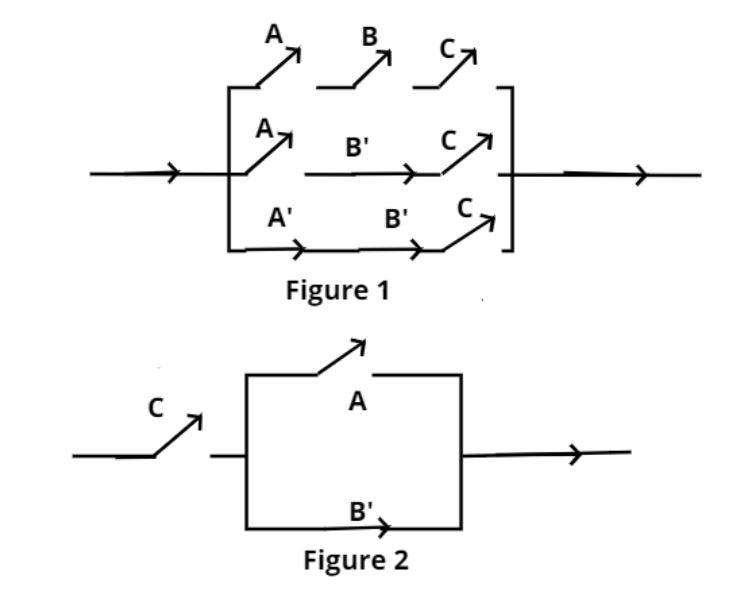Question
Question: A, B and C represents switches in ‘on’ position and A’, B’ and C’ represents them in ‘off’ position....
A, B and C represents switches in ‘on’ position and A’, B’ and C’ represents them in ‘off’ position. Construct a switching circuit representing the polynomial ABC+AB′C+A′B′C. Using Boolean algebra, prove that the given polynomial can be simplified to C(A+B′). Construct an equivalent switching circuit.
Solution
Hint: Use the property of Boolean algebra which are A.A = A,{\text{ }}A.A' = 0,{\text{ }}A\left( {1 + B'} \right) = A,{\text{ & }}\left( {A + A'} \right) = 1 for solving this problem.
Complete step-by-step answer:
Given polynomial is ABC+AB′C+A′B′C switching circuit representing the given polynomial is shown in figure (1), where A, B and C represents switches in ‘on’ position and A’, B’ and C’ represents them in ‘off’ position

Now we have to prove that
ABC+AB′C+A′B′C=C(A+B′)
Consider L.H.S
ABC+AB′C+A′B′C
Take AC common from first two terms
⇒AC(B+B′)+A′B′C
As we know in Boolean algebra value of (B+B′) is equal to one
⇒AC(B+B′)+A′B′C=AC+A′B′C
Now take C as common
⇒AC+A′B′C = C(A+A′B′).............(1)
Now (A+A′B′) is written as(A+A′)(A+B′), property of Boolean algebra.
Because we know in Boolean algebra the value of A.A = A,{\text{ }}A.A' = 0,{\text{ & }}A\left( {1 + B'} \right) = A
So,
(A+A′)(A+B′)=A.A+A.B′+A.A′+A′B′ =A+AB′+0+A′B′ =A(1+B′)+A′B′=A+A′B′
Therefore
(A+A′B′)=(A+A′)(A+B′)
Therefore from equation (1)
⇒ABC+AB′C+A′B′C=C(A+A′B′)=C(A+A′)(A+B′)
Now as we know in Boolean algebra value of (A+A′) is equal to one
⇒ABC+AB′C+A′B′C=C(A+B′)
=R.H.S
Hence Proved.
And the equivalent representation is shown in figure (2), where A, B and C represents switches in ‘on’ position and A’, B’ and C’ represents them in ‘off’ position.
Note: Whenever we face such types of questions always remember some of the basic properties of the Boolean algebra which is stated above then using these properties simplify the given polynomial, we will get the required answer.
